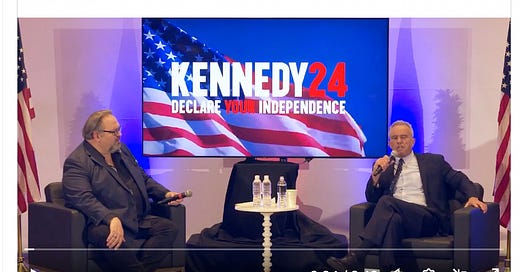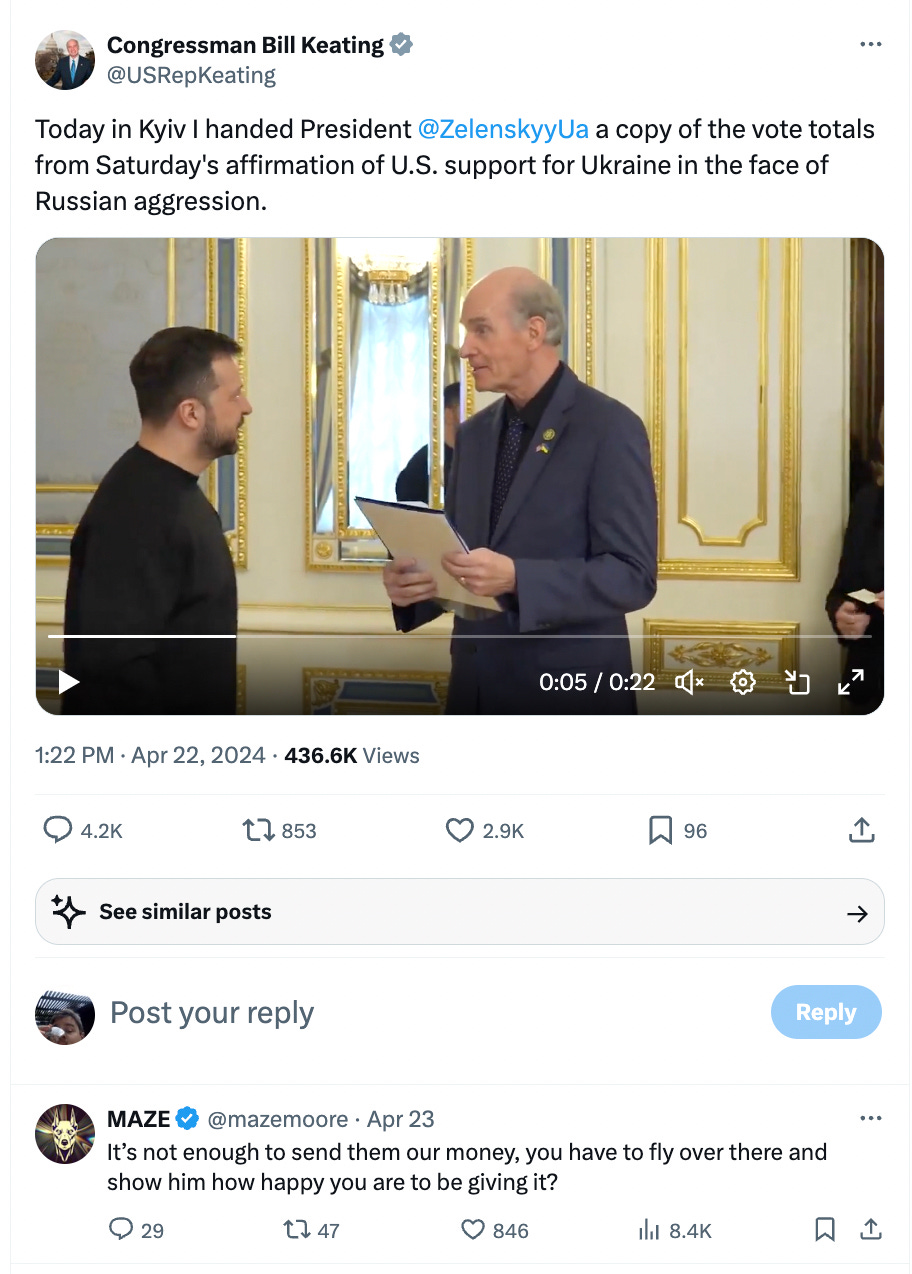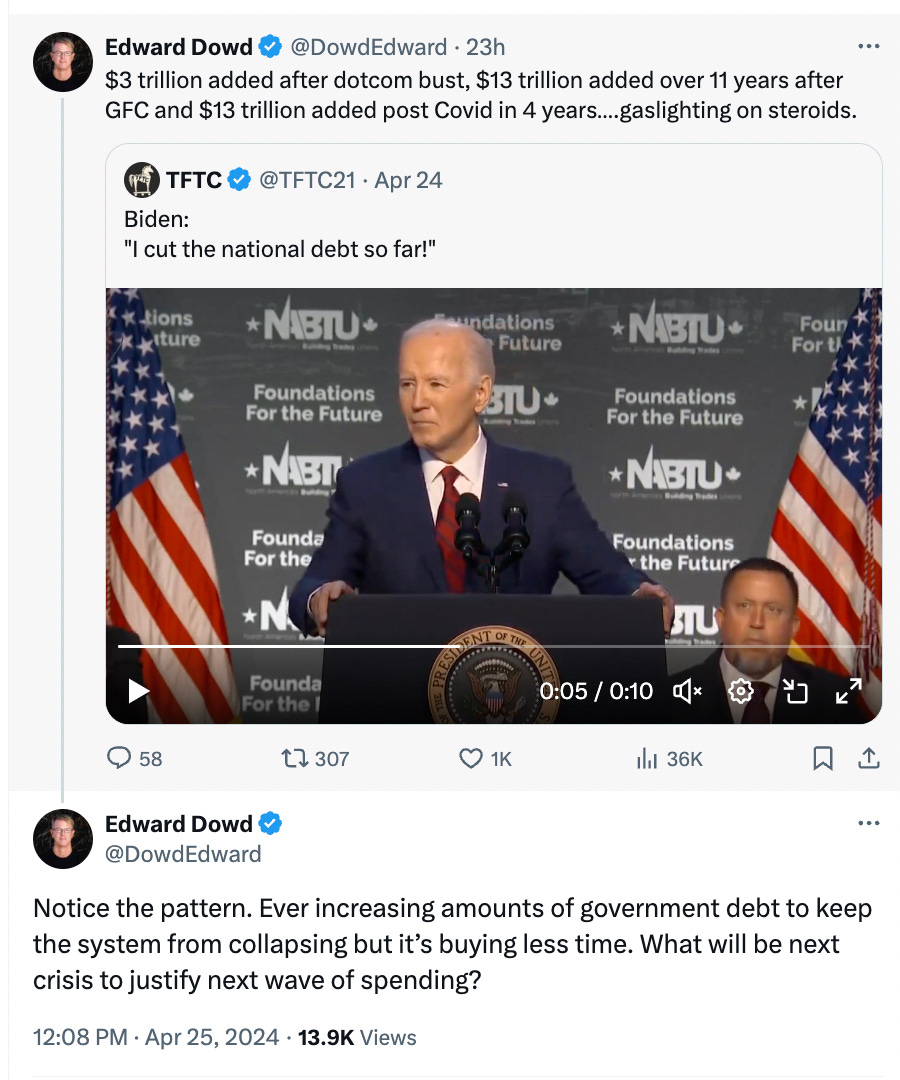The Four Problems in American Politics
are possibly just the four problems in everyone's politics
Six months ago I was sure that 2024 was going to be ugly and dangerous, a long period of manufactured crisis ahead of the election. What I didn’t anticipate was the relentless dipshittedness of the crisis and danger. It’s like the Weimar edition of Dumb and Dumber, and my bone-deep personal instinct is to ignore it all. Donald Trump on trial in Manhattan: stupid.
"This is a Frankenstein case," Turley said. "They took a dead misdemeanor, they attached it to a dead alleged federal felony and zapped it back into life. Many of us are just amazed to watch this actually walk into court because it's not a recognizable crime that any of us have seen."
Correct. Obvious. I’m unable to analyze dipshittery. We just have wave after wave of sub-moronic performance theater, the point of which is to distract and demoralize. The Supreme Court just faked a long and serious debate over the existence of presidential immunity, while all of the justices are shielded from legal consequences over their handling of the case because of judicial immunity. Why pretend to honor that?
In a functioning country with adversarial politics, a dozen border county DAs would bullshit-indict Joe Biden this week for aiding and abetting human trafficking, and announce that they’ll wait to handcuff and perp walk him until 12:01 on January 20 as he leaves the White House, at which point the courts would instantly and miraculously rediscover presidential immunity. No one actually believes that no form of presidential immunity exists, but Orange Man Bad, so we’re going to pretend for a while. I decline.
So. What’s happening in American politics? Four tentative answers, bundled at the end into one big theme:
First, Robert F. Kennedy is well to my left on policy, and his choice of a running mate was just silly. He’s not someone I would vote for. But look what he keeps doing:
Those are real things: the explosive expense and complexity of healthcare versus the relentless growth of chronic disease is a discussion of something that’s actually happening, and the emergence of widespread chronic disease among children is extremely disturbing. Who else is talking about it?
So the most obvious reality of American politics is that it’s 90% distraction operation. Large numbers of children are chronically in poor health while we pay trillions of dollars for healthcaLOOK THAT ORANGE BASTARD PAID MONEY TO STORMY DANIELS!!!!! The point of American politics is to avoid talking about politics with faked-up culture war bullshit and nonsensical Orange Man hysterics. “Politics” is the word we use for fake discussions that distract from reality.
Second, we have “representative” government with no representation, no functioning political inputs. I’ve written many times — here’s one example — about the 80+% sentiment in deep-blue California in favor of parental notification policies in schools. Californians overwhelmingly favor something, so California government is fiercely opposed to it, and every policy effort on the question is militantly opposed to the near-universal public sentiment.
Compare this to congressional support for the bonfire of cash and human life in Ukraine. Polling on this question is very strange and hard to parse, like this poll that frames opposition to Ukrainian aid as support for Russia, which is “the former Soviet Union.” They…don’t know…that Ukraine…uh…
And so on:
Regardless of party, voters aged 50 and older were more likely to view Russia as an enemy (44%) compared with voters aged 18 to 49 (29%). Younger voters were also more inclined to see Russia as an ally (36%) compared with those over 50 (20%).
If you don’t want to send constant injections of tens of billions of dollars in aid to Ukraine, see, you’re saying that Russia is our ally. And then let’s pause to imagine polling the sentiment of a public that knows literally nothing at all about anything: “Those who either didn’t know or didn’t recall who won the Cold War that lasted from 1947 through 1989, when the Soviet Union collapsed, were evenly divided between supporting and not supporting Ukraine.” I may have to self-lobotomize with household tools, so listen for the screams.
Trying to pierce of all that Alice in Wonderland framing, here’s the alleged bottom line: “A majority of Americans (53%) support sending weapons and military aid to Ukraine, according to a new CBS News poll conducted with the market research firm, YouGov….Sending more aid to Ukraine is strongest among Democrats (74%) and independent voters (50%).” Republicans are nearly 70% opposed.
That’s some pretty soft support by any measure. But polling “support” without polling frequency, duration, or scope is an interesting choice. How many Americans support hundreds of billions of dollars in free money to Ukraine for years and years, without limit, and how many people support military aid without an attempt to negotiate a peace settlement? People support [idea], but how much do they support [actual details]? How many people support this indescribably pathetic late-imperial decline-signaling cringe?
I literally just vomited in my mouth a little as I thought about the existence of Bill Keating.
Nor is it clear how endless Ukrainian aid ranks among competing concerns, and it’s extremely doubtful that a majority of Americans favor unlimited free money for Ukraine far ahead of all other priorities, especially when the Ukrainians keep stealing it. I keep thinking of the line in Head Office, from the discussion with a foreign dictator: “Your country is rich. You can afford the free press and the Mercedes. But my country is very poor — we can only afford the Mercedes.”
But none of this matters. Public sentiment has no effect on government policy. The thing does what the thing wishes to do.
So the second most obvious reality of American politics is that power doesn’t care about public sentiment. You can oppose whatever you want, peasant, but don’t think that it means something. Institutions have no levers that people outside of the institutions can get their hands on.
This seems to be emerging, globally, as a universal experience, and (for example) no amount of Canadian despair manages to dislodge Justin Trudeau or his batshit ministers.
Third, while institutions have no levers that allow for course corrections, a small but significant population is similarly closed to inputs. I wrote recently about the people who knew in 2016 that Donald Trump was going to put everyone in concentration camps if he became president. Then he served a full term as president, and now, in 2024, the people who knew in 2016 that Donald Trump was going to put everyone in concentration camps if he became president know that Donald Trump is going to put everyone in concentration camps if he becomes president.
We have a population that can’t respond to evidence. HE’S MURDERING ALL THE KITTENS. No, look, he’s petting the kittens. YES I SEE HE’S MURDERING THE KITTENS WITH HIS BARE HANDS.
This population feeds on emptied language. Disagreement is fascist, and wars they don’t like are genocide. All discussion is emotionally loaded. Their performative emotionspeak is a hard epistemic shell. The closed institutions use these people as a shiny object and a shield — “warfare by psyop, utilizing misinformation and sentiment engineering.”
So the third most obvious reality of American politics is that there is no reality in a good portion of American popular politics, and stop genociding me, you Nazis.
Fourth, and as the thing I suspect is the great underlying force, we have institutions that live on buckets of stored money, and the threat of lost buckets is driving economic policy.
This is a theme that I’ll need to develop this year, and I only have a portion of the thought in my head. Persistent inflation guts the wage-dependent, but keeps markets afloat; it works well for real estate owners and people with investment portfolios. This reality contains a bunch of structural traps, as when local governments in California face more and more expensive police and fire salaries to keep up with inflation, but need inflation to keep the CalPERS investment portfolio growing to pay police and firefighter pension benefits.
Similarly, a reader asked me recently if I’d ever looked at the balance sheets of any large nonprofit hospitals. Hedge funds with some treatment beds attached, he called them. Inflation floats their portfolios. More to come on this.
So the fourth reality of American politics is that we have several forms of overlapping class warfare underway, driving our limited-input institutional choices, but most of the warfare is happening in the form of submarine war, which doesn’t look like war from the surface.
The overarching theme common to all of these individual themes is closed discursive systems: “It’s a club, and you ain’t in it.” And that’s why a country with a massive chronic illness problem and a $4.3 trillion healthcare system that doesn’t care for health very much is deeply invested in the Orange Devil’s made-up bookkeeping felonies.






Chris, thank you for a brilliant - and deeply disturbing - analysis of what is and isn't happening in our country politically, economically and culturally - and why. How the F do we unwind this crazy shit and try to return to something resembling the old normal?
Hello Chris. Thanks for the article. I spent many of my younger years studying, practicing and implementing many forms of dipshittery.
In fact I wrote a thesis on “Dipshittery in Modern America” for one of my many doctorate’s degrees in the many disciplines of dipshittery. I can unequivocally confirm that today’s political arena falls well within the scope of not just dipshittery, but highly gifted dipshittery. A form of dipshittery that can only be expressed by the most proficient dipshit masters. Dipshittery students will be studying this era of dipshittery with amazement for many years.